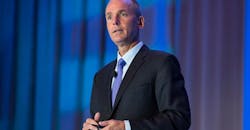Boeing Says US-China Trade Spat a Concern for Aerospace World
Boeing Co. CEO Dennis Muilenburg said he’s concerned about the possible fallout from the U.S.-Chinese trade dispute that’s gathering momentum because his industry relies on the free flow of goods.
Speaking at the Farnborough air show south of London, Muilenburg said finding a solution to the dispute is “an important topic to us.” Aerospace is the biggest trade-surplus generator in the U.S. and provides key manufacturing jobs, while China relies on foreign aircraft to help fuel economic growth, Muilenburg said.
“We are concerned about some of the discussions right now around trade,” the CEO said in an interview with Bloomberg Television. “Our aerospace business thrives on free and open global trade and we’re hopeful we’re going to find solutions as alternatives to some of the tariff discussions that have been going on.”
Airbus and Boeing are locked in a global duopoly for most of their aircraft, so any imbalance stands to hand the other side an advantage. While Airbus benefiting from the current trade spat is “a concern we have,” Muilenburg dismissed the notion of any sudden shifts in order or backlog patterns because the industry is long-term and Boeing has an established presence in China.
Besides its relationships with China, Boeing can also rely on its proximity to the U.S. government. The company has “a seat at the table” as it tries to contribute to a solution to the trade dispute, Muilenburg said. “Our voice is being heard.”
The two aerospace giants are facing off this week at the Farnborough event, which alternates with Paris as the year’s biggest showcase for orders and announcements in the aviation world.
Airbus stands to pull in deals for its A320neo and A350 fleet, while investors are waiting for an update from Boeing on a new aircraft that would slot in between its 737 narrow-body and 787 wide-body jets. Muilenburg reiterated in the interview that the company wants to make a decision on the new aircraft next year, and is holding onto a time slot of 2025 for a possible debut.
By Guy Johnson
About the Author
Bloomberg
Licensed content from Bloomberg, copyright 2016.
